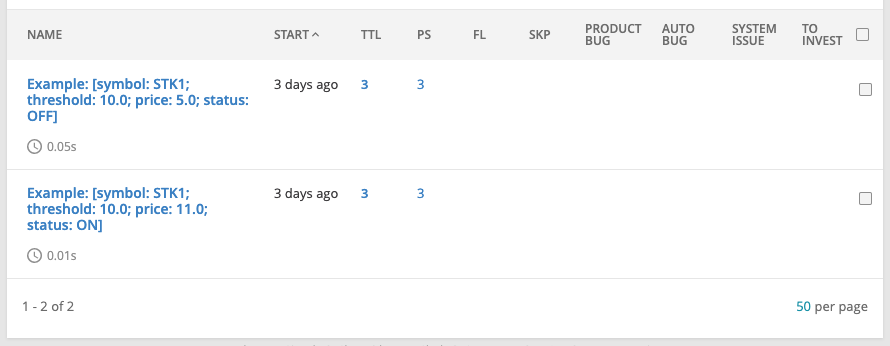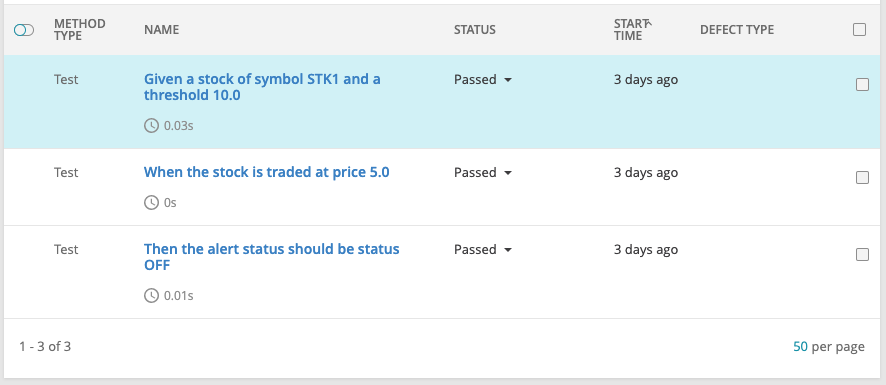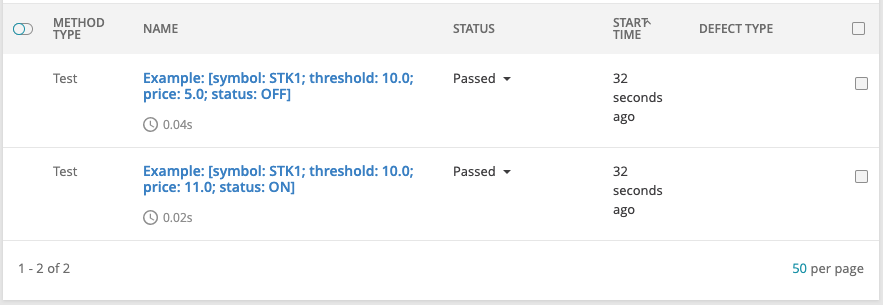https://github.com/reportportal/agent-java-jbehave
JBehave reporters for Report Portal
https://github.com/reportportal/agent-java-jbehave
java jbehave reportportal
Last synced: 2 months ago
JSON representation
JBehave reporters for Report Portal
- Host: GitHub
- URL: https://github.com/reportportal/agent-java-jbehave
- Owner: reportportal
- License: apache-2.0
- Created: 2016-10-10T11:08:35.000Z (almost 9 years ago)
- Default Branch: develop
- Last Pushed: 2025-06-16T10:17:39.000Z (4 months ago)
- Last Synced: 2025-07-08T06:03:35.600Z (3 months ago)
- Topics: java, jbehave, reportportal
- Language: Java
- Homepage:
- Size: 1.01 MB
- Stars: 7
- Watchers: 7
- Forks: 6
- Open Issues: 1
-
Metadata Files:
- Readme: README.md
- Changelog: CHANGELOG.md
- License: LICENSE
Awesome Lists containing this project
README
# Report Portal Java reporter for JBehave tests
> **DISCLAIMER**: We use Google Analytics for sending anonymous usage information such as agent's and client's names,
> and their versions after a successful launch start. This information might help us to improve both ReportPortal
> backend and client sides. It is used by the ReportPortal team only and is not supposed for sharing with 3rd parties.
[](https://central.sonatype.com/artifact/com.epam.reportportal/agent-java-jbehave)
[](https://github.com/reportportal/agent-java-jbehave/actions/workflows/ci.yml)
[](https://codecov.io/gh/reportportal/agent-java-jbehave)
[](https://slack.epmrpp.reportportal.io/)
[](http://stackoverflow.com/questions/tagged/reportportal)
[](http://reportportal.io?style=flat)
The latest version: 5.4.0. Please use `Maven Central` link above to get the agent. **For JBehave version 5.0 and
higher**
## Overview: How to Add ReportPortal Logging to Your JBehave Java Project
To start using Report Portal with JBehave framework please do the following steps:
1. [Configuration](#configuration)
* Create/update the `reportportal.properties` configuration file
* Build system configuration
2. Logging configuration
* [Logback Framework](#logback-framework)
* Create/update the `logback.xml` file
* Add Logback dependencies
3. [Running tests](#test-run)
* Add test runner class
* Build system commands
Additionally, you may want to configure [Step reporter or Scenario reporter](#steps-vs-scenarios). They are regulate how
Report Portal count your tests. Step reporter posts statistics per a test step (each test step is counted in 'total'
column). Scenario reporter posts statistics per a scenario.
## Configuration
### 'reportportal.properties' configuration file
To start using Report Portal you need to create a file named `reportportal.properties` in your Java project in a source
folder `src/main/resources` or `src/test/resources` (depending on where your tests are located):
**reportportal.properties**
```
rp.endpoint = http://localhost:8080
rp.api.key = e0e541d8-b1cd-426a-ae18-b771173c545a
rp.launch = JBehave Tests
rp.project = default_personal
```
**Property description**
* `rp.endpoint` - the URL for the report portal server (actual link).
* `rp.api.key` - an access token for Report Portal which is used for user identification. It can be found on your report
portal user profile page.
* `rp.project` - a project ID on which the agent will report test launches. Must be set to one of your assigned
projects.
* `rp.launch` - a user-selected identifier of test launches.
The full list of supported properties is located here in client-java library documentation (a common library for all
Java agents): https://github.com/reportportal/client-java
### Build system configuration
#### Maven
`pom.xml`
```xml
UTF-8
1.8
1.8
5.1.1
**/*Stories.java
-skip
com.epam.reportportal
agent-java-jbehave
5.4.0
org.jbehave
jbehave-core
${jbehave.core.version}
org.apache.maven.plugins
maven-compiler-plugin
3.5.1
org.jbehave
jbehave-maven-plugin
${jbehave.core.version}
embeddable-stories
test
${embeddables}
true
false
1
${meta.filter}
run-stories-as-embeddables
```
#### Gradle
`build.gradle`
```groovy
plugins {
id 'java'
}
sourceCompatibility = JavaVersion.VERSION_1_8
targetCompatibility = JavaVersion.VERSION_1_8
repositories {
mavenCentral()
}
def jbehaveVersion = '5.1.1'
dependencies {
testCompile "org.jbehave:jbehave-core:${jbehaveVersion}"
testCompile "org.jbehave:jbehave-navigator:${jbehaveVersion}"
testCompile 'com.epam.reportportal:agent-java-jbehave:5.4.0'
testCompile 'com.epam.reportportal:logger-java-logback:5.2.2'
}
test {
outputs.upToDateWhen { return false }
testLogging.showStandardStreams = true
// Setup execution filters, ignore scenarios with '@skip' tag
systemProperty "metaFilters", System.getProperty("filter", "-skip")
systemProperty "story", System.getProperty("story", "*.story")
doFirst {
file('target').mkdirs() // JBehave doesn't work without this folder
}
doLast {
// copy all style and javascript files to get fancy report
def jbehave = "${classpath.find { it.name.contains('jbehave-core') }}"
def jbehaveStyle = "${classpath.find { it.name.contains('jbehave-navigator') }}"
copy {
from(zipTree(jbehave)) {
include "style/*"
}
into("build/classes/java/jbehave/view")
}
copy {
from(zipTree(jbehaveStyle)) {
include "js/**/*"
include "style/**/*"
include "images/*"
}
into("build/classes/java/jbehave/view")
}
// the folder will be empty folder, so remove it
file('target').delete()
}
}
```
## Logging configuration
### Logback Framework
#### 'logback.xml' file
```xml
%d{HH:mm:ss.SSS} %-5level %logger{5} - %thread - %msg%n
%d{HH:mm:ss.SSS} [%t] %-5level - %msg%n
[%t] - %msg%n
```
#### Add Logback dependencies
##### Gradle
To route your logs into Report Portal you should add `logger-java-logback` dependency into the corresponding section:
```build.gradle```
```groovy
// inside 'dependencies' section
testCompile 'com.epam.reportportal:logger-java-logback:5.2.2'
```
It should be already here if you used gradle configuration listed above.
## Test run
### Test runner class
JBehave requires runtime configuration, to do this place the following class into your `src/main/java` (for Maven)
or `src/test/java`
(for Gradle) folders. Notice that you need replace step initialization in `stepsFactory` method with your own:
`MyStories.java`
```java
import com.epam.reportportal.example.jbehave.steps.*;
import com.epam.reportportal.jbehave.ReportPortalStepFormat;
import org.jbehave.core.Embeddable;
import org.jbehave.core.configuration.Configuration;
import org.jbehave.core.configuration.MostUsefulConfiguration;
import org.jbehave.core.i18n.LocalizedKeywords;
import org.jbehave.core.io.CodeLocations;
import org.jbehave.core.io.LoadFromClasspath;
import org.jbehave.core.io.StoryFinder;
import org.jbehave.core.junit.JUnitStories;
import org.jbehave.core.model.ExamplesTableFactory;
import org.jbehave.core.model.TableTransformers;
import org.jbehave.core.parsers.RegexStoryParser;
import org.jbehave.core.reporters.StoryReporterBuilder;
import org.jbehave.core.steps.InjectableStepsFactory;
import org.jbehave.core.steps.InstanceStepsFactory;
import org.jbehave.core.steps.ParameterConverters;
import org.jbehave.core.steps.ParameterConverters.DateConverter;
import org.jbehave.core.steps.ParameterConverters.ExamplesTableConverter;
import java.text.SimpleDateFormat;
import java.util.List;
import java.util.stream.Collectors;
import static java.util.Optional.ofNullable;
import static org.jbehave.core.io.CodeLocations.codeLocationFromClass;
import static org.jbehave.core.io.CodeLocations.getPathFromURL;
import static org.jbehave.core.reporters.Format.CONSOLE;
import static org.jbehave.core.reporters.Format.HTML;
/**
*
* {@link Embeddable} class to run multiple textual stories via JUnit.
*
*
* Stories are specified in classpath and correspondingly the {@link LoadFromClasspath} story loader is configured.
*
*/
public class MyStories extends JUnitStories {
public MyStories() {
configuredEmbedder().embedderControls()
.doGenerateViewAfterStories(true)
.doIgnoreFailureInStories(true)
.doIgnoreFailureInView(true)
.useThreads(1)
.useStoryTimeouts("60");
}
@Override
public Configuration configuration() {
Class extends Embeddable> embeddableClass = this.getClass();
// Start from default ParameterConverters instance
ParameterConverters parameterConverters = new ParameterConverters();
TableTransformers tableTransformers = new TableTransformers();
// factory to allow parameter conversion and loading from external resources (used by StoryParser too)
ExamplesTableFactory examplesTableFactory = new ExamplesTableFactory(new LocalizedKeywords(),
new LoadFromClasspath(embeddableClass),
tableTransformers
);
// add custom converters
parameterConverters.addConverters(new DateConverter(new SimpleDateFormat("yyyy-MM-dd")),
new ExamplesTableConverter(examplesTableFactory)
);
return new MostUsefulConfiguration().useStoryLoader(new LoadFromClasspath(embeddableClass))
.useStoryParser(new RegexStoryParser(examplesTableFactory))
.useStoryReporterBuilder(new StoryReporterBuilder().withCodeLocation(CodeLocations.codeLocationFromClass(
embeddableClass)).withFormats(CONSOLE, HTML, ReportPortalStepFormat.INSTANCE))
.useParameterConverters(parameterConverters);
}
@Override
public InjectableStepsFactory stepsFactory() {
return new InstanceStepsFactory(configuration(),
// Your steps instantiation go here
new LogLevelTest(),
new ReportAttachmentsTest(),
new ReportsStepWithDefectTest(),
new ReportsTestWithParameters(),
new ApiSteps()
);
}
@Override
public List storyPaths() {
String storyPatternToRun = ofNullable(System.getProperty("story")).filter(s -> !s.isEmpty())
.map(s -> "**/" + s)
.orElse("**/*.story");
return new StoryFinder().findPaths(getPathFromURL(codeLocationFromClass(this.getClass())),
storyPatternToRun,
"**/excluded*.story"
)
.stream()
.distinct()
.collect(Collectors.toList());
}
}
```
### Build system commands
We are set. To run set we just need to execute corresponding command in our build system.
#### Maven
`mvn test` or `mvnw test` if you are using Maven wrapper
#### Gradle
`gradle test` or `gradlew test` if you are using Gradle wrapper
## Steps vs scenarios
Let's take a look on a simple example:
```
Scenario: Stock trade alert
Given a stock of symbol and a threshold
When the stock is traded at price
Then the alert status should be status
Examples:
|symbol|threshold|price|status|
|STK1|10.0|5.0|OFF|
|STK1|10.0|11.0|ON|
```
### Step reporter
Step reporter posts statistics per test step. On example above Report Portal display 6 test units. Each example row will
be a suite,
as on screenshots below and each test step will be marked as a test.



To use Step reporter you need to set `ReportPortalStepFormat.INSTANCE` constant as your story reporter format in
configuration:
```java
new MostUsefulConfiguration().useStoryLoader(new LoadFromClasspath(embeddableClass))
.useStoryParser(new RegexStoryParser(examplesTableFactory))
.useStoryReporterBuilder(new StoryReporterBuilder()
.withCodeLocation(CodeLocations.codeLocationFromClass(embeddableClass))
.withDefaultFormats()
.withFormats(ReportPortalStepFormat.INSTANCE))
.useParameterConverters(parameterConverters);
```
### Scenario reporter
Scenario reporter posts statistics per a scenario. On example above Report Portal display 2 test units. Each example row
will be a test,
as on screenshots below and each test step will be a nested step.



To use Scenario reporter you need to set `ReportPortalScenarioFormat.INSTANCE` constant as your story reporter format in
configuration:
```java
new MostUsefulConfiguration().useStoryLoader(new LoadFromClasspath(embeddableClass))
.useStoryParser(new RegexStoryParser(examplesTableFactory))
.useStoryReporterBuilder(new StoryReporterBuilder()
.withCodeLocation(CodeLocations.codeLocationFromClass(embeddableClass))
.withDefaultFormats()
.withFormats(ReportPortalScenarioFormat.INSTANCE))
.useParameterConverters(parameterConverters);
```